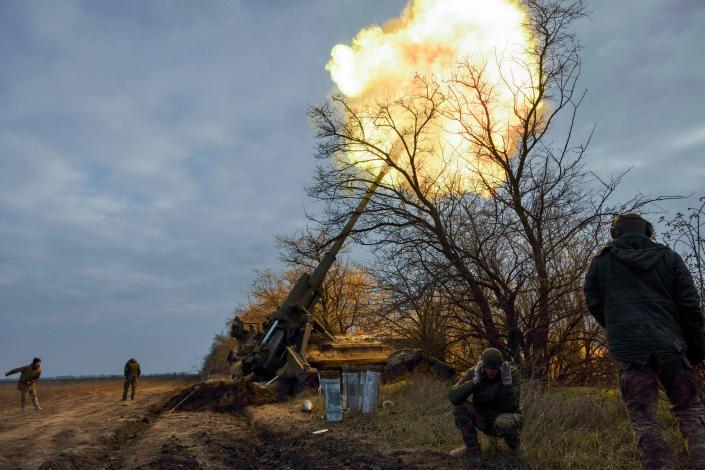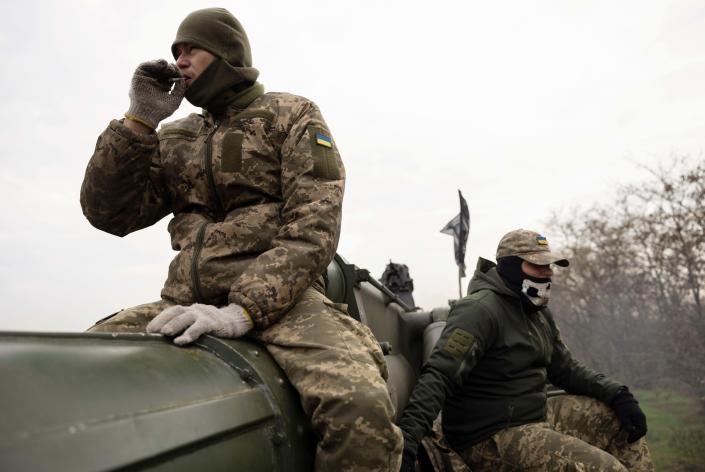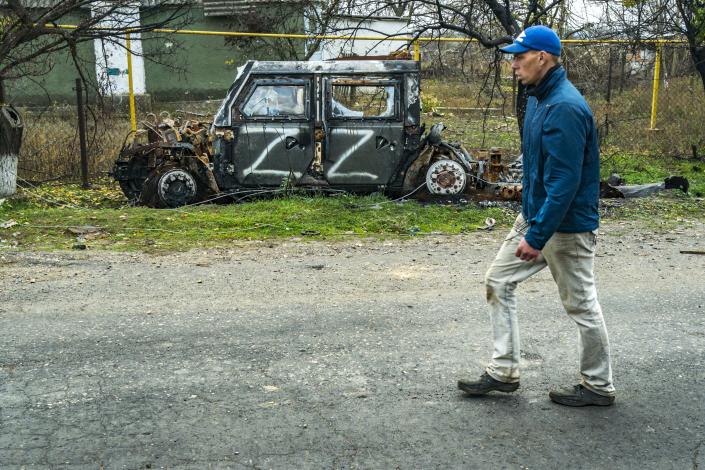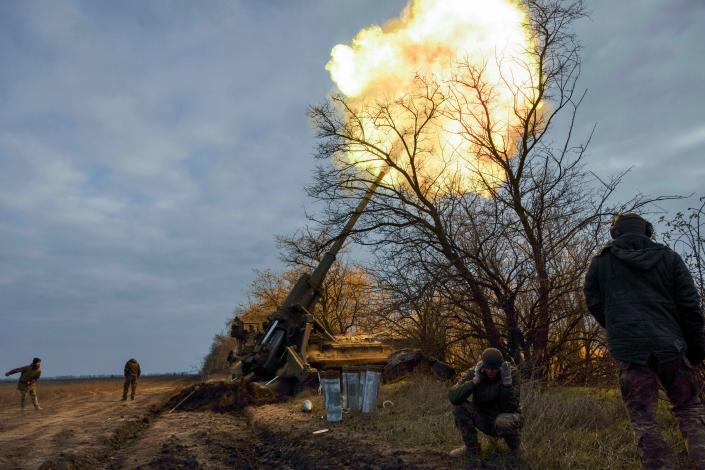The Kremlin ordering its troops to retreat from the southern Ukrainian city of Kherson and much of its surrounding region may be one of the biggest setbacks yet for Russian President Vladimir Putin‘s war.
Wary Ukrainian officials have greeted the news with caution, rather than celebration, warning that Russian forces plan to turn it into a “city of death” filled with mines and bombarded by artillery fire.
But signs pointed to a humiliating exit rather than a trap — with Moscow’s military saying Thursday that a withdrawal had begun, and Kyiv’s troops advanced in its wake.
After more than nine months, the conflict has seen 100,000 troops killed or injured on each side, according to Gen. Mark Milley, chairman of the Joint Chiefs of Staff, who told an event in New York on Wednesday that he believed a Russian retreat was indeed underway.
Ukraine retaking the prized port city could mark a decisive moment, Western officials and military analysts said.
Here’s what to know about one of the most important developments of the war so far.
Why is Russia retreating?
Moscow’s defense ministry said Thursday that “the maneuver of Russian troops to the prepared positions” on the other side of the Dnieper River was underway “in strict accordance with the approved plan.”
Defense Minister Sergei Shoigu and Gen. Sergei Surovikin, the overall commander of Russian forces in Ukraine, announced the move a day earlier in a televised address that followed weeks of hints it may be necessary to pull back to more defensible lines in the face of a grinding counteroffensive.


Holding the city had become almost impossible, analysts say.
“Because Ukraine has fire control over the main bridges that cross the left bank onto the right bank of the Dnieper River, it would be very difficult to supply some 3,000 soldiers, especially with winter coming along,” said Rajan Menon, a director at Defense Priorities, a Washington-based think tank.
Despite the caution in Ukraine, the commander in chief, Valerii Zaluzhnyi, said Thursday it was clear that his military’s success had forced Russian troops back by destroying their supply routes.
“The enemy was left with no other option than to flee,” he said in a post on Telegram.
Analysts and local Kremlin-installed officials had suggested a retreat was inevitable for weeks, so why now?
“I found it interesting they waited until after the election to make that judgment, which we knew for some time that they were going to be doing,” President Joe Biden told a post-midterms news conference at the White House on Wednesday, adding that “it’s evidence of the fact that they have some real problems, the Russian military.“
His theory was supported by one of the Kremlin’s chief propagandists.
On his popular talk show on Russian state TV on Wednesday, the prominent commentator Vladimir Solovyov said that if “we would have left before the 8th, it would help the Democrats in the election, it would have been a gift to Biden.”
What happens now?
Ukrainian forces were already sweeping forward Thursday into previously occupied territory, despite Kyiv’s public caution.
It was unclear whether they would immediately seek to enter the city, which had a prewar population of about 380,000 but has seen masses of civilians evacuated by Russian authorities in recent weeks.


At least in the short term, analysts said, the retreat makes sense.
“The Russian military has been increasingly isolated on the right bank of the Dnieper,” said Michael Horowitz, head of intelligence at Le Beck, a security consultancy, “making it difficult to hold positions despite the arrival of newly mobilized soldiers.”
“The Dnieper does offer a natural barrier that can be more easily defended. The Russians have also been working on setting up defenses on the other side of the Dnieper for several weeks now.”
But Ukraine continues to enjoy robust Western support — likely boosted by better-than-expected results for Democrats in this week’s midterms — and Putin’s options appear limited.
“On a military front, the Russians are in a situation that Putin never expected to find himself, and I don’t think he has a good plan or way forward,” Menon said.
“The only real strategy Russia has is to increase its attacks against the Ukrainian homefront, which has been Moscow’s main coping mechanism so far,” Horowitz said. “Russia is effectively digging its heels, hoping to inflict a cost upon Ukrainian civilians, after failing to defeat the Ukrainian army.”
How is this being seen in Russia?
The move is unlikely to be seen favorably in Russia, where criticism of the war has been growing and where Kherson had only recently been portrayed as joining the nation forever.
“This is going to be a difficult decision to sell at home, particularly after Putin effectively doubled down by annexing all of the occupied territories Moscow managed to capture in Ukraine,” Horowitz said.
He added that it was notable that the retreat was announced by Surovikin and not Putin, likely a deliberate tactic to protect the president from criticism.
Many Russian commentators and propagandists called the retreat a necessary and realistic step to maintain the goals of the “special military operation” and avoid an even more humiliating defeat.
On his talk show, Solovyov summed up the opinion of many pro-Russian voices, including some influential military bloggers, by describing it as a “courageous” and “difficult” decision.
Not everyone approved, however. Sergei Markov, a commentator and a former adviser to Putin, said: “The surrender of Kherson is the largest geopolitical defeat of Russia since the collapse of the USSR. The political consequences of this huge defeat will be really big,”
Writing on his Telegram channel Wednesday, he blamed the retreat on a “catastrophic delay in making the necessary decisions.”


Will this change the course of the war?
Some of Russia’s early gains are now seemingly being sacrificed so it can keep hold of as much land as its military can protect.
Kherson was the only regional capital city seized and controlled by Russia since its full-scale invasion Feb. 24. Its capture helped ensure access to the coast and allowed the Kremlin to create a land corridor across Ukraine’s south.
Kherson also acts as a vital gateway to the Crimean Peninsula, which Russia has occupied since 2014.
Russia still holds much of the wider Kherson region, which Putin illegally proclaimed he was annexing along with three other regions recently, but it will need to defend its new positions steadfastly to retain that crucial supply route.
“The tactical advantages are clear: moving toward a more easily defended line and avoiding a costly defeat,” Horowitz said.
“But so are the strategic consequences for Russia, as Moscow increasingly loses the initiative, and the leverage it needs to force a diplomatic settlement — which I think is Russia’s last remaining option to salvage its “special operation.”
In his comments Wednesday at the Economic Club of New York, Milley said it’s possible Russia will use the retreat to reset its troops for a spring offensive, but “there’s also an opportunity here, a window of opportunity for negotiation.”
Ukrainian President Volodymyr Zelenskyy this week appeared to soften his stance on never negotiating with Putin. Some U.S. and Western officials increasingly feel neither side can achieve an outright victory and see the winter as a shot at diplomacy.
Beyond the strategic implications, the psychological effect of the retreat on both sides may be almost as important.
“There’s ample evidence of low morale among Russian units, including recently mobilized soldiers who have been left without any supply,” Horowitz said. “A withdrawal (even a planned one) certainly won’t help, and will continue to galvanize Ukrainian soldiers, who can feel victory is now within reach.”
It may also serve as a much-needed morale boost for the Ukrainian public.
“It comes at a time when the lights are out in Kyiv and Russia is hitting power plants, pumping stations and sewage works, and people are really living in a way that they haven’t before,” Menon said.
“So it’s a fillip at a time when the Ukrainians could use some good news.”
This article was originally published on NBCNews.com




